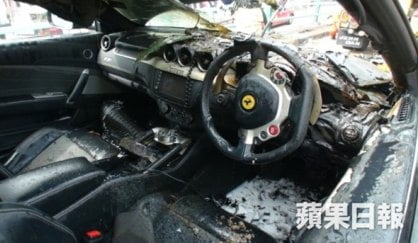 Thousands of Mainland toddlers pee-pee in the street the length and breadth of Mongkok and beyond. The MTR transforms itself overnight from best mass-transit on the planet to a morass of service disruptions and mega-project delay cover-ups. And Beijing threatens to retaliate against Hong Kong’s Occupy Central civil disobedience movement by flooding the city with surly, malodorous panda bears. With everything apparently going disastrously wrong, it is important to keep things in perspective and remind ourselves that it’s not all bad. Indeed, there are even a few signs of things going right.
Thousands of Mainland toddlers pee-pee in the street the length and breadth of Mongkok and beyond. The MTR transforms itself overnight from best mass-transit on the planet to a morass of service disruptions and mega-project delay cover-ups. And Beijing threatens to retaliate against Hong Kong’s Occupy Central civil disobedience movement by flooding the city with surly, malodorous panda bears. With everything apparently going disastrously wrong, it is important to keep things in perspective and remind ourselves that it’s not all bad. Indeed, there are even a few signs of things going right.
First of all, a HK$5.5 million Ferrari spontaneously combusts on the Canal Road Flyover. Had God just finished reading Thomas Piketty’s Capital in the Twenty-First Century? Whatever the reason, could anything else at this time bring such an exquisite little ray of sunshine into our lives? It is surely an omen.
Which brings us to the Hong Kong Bar Association’s pronouncement that the Basic Law does not permit public nomination of candidates for the Chief Executive election in 2017. This is not what many pro-democrats want to hear, but it is important that they come to terms with this reality. The drafters of Hong Kong’s mini-constitution used the wording about a ‘broadly representative nominating committee’ for a reason: as a Communist one-party state, China must be able to rig the ballot if it ever relinquishes the right to rig the election. So long as the Communist Party is in power, this isn’t negotiable. As the forces of liberty and justice, the pro-dems should leave indulging in fantasy to Beijing and its denials of June 4, blather about Internet order/freedom and crushing of lame Barbarian TV shows like The Big Bang Theory.
There are numerous ways Beijing could introduce semi- (post-nomination) universal suffrage and nonetheless micro-manage the election itself. Maybe it is naïve to think it will not do that out of paranoiac instinct. But such a tactic would easily backfire, say through a citywide boycott of the election, leaving the ‘winner’ in an even more hopeless situation than his almost-openly appointed predecessors. And the Chinese officials’ hard line on nomination (and on the ‘love the nation’ stuff) suggests that they have reluctantly reconciled themselves to conceding the final decision to the electorate – out of despair at nothing else working.
The implications and repercussions could be serious. China’s leaders will have to explain to their Mainland citizens why the Hong Kong people, as well as having safe milk powder and an open Internet, get to choose (to a hitherto unthinkable extent) their own leader.
Beijing will also have to manage its relations with the more mercenary parts of its Hong Kong power base, whose loyalty has so far been bought with policies that harm the greater community. Real constitutional reform represents change to the distribution of local power, and any degree of popular contest among rival CE candidates implies a shift in influence away from vested interests to the overall population. Beijing’s officials are brought up on this stuff, so this must be part of their calculations about how best to control this city. But soft, un-Machiavellian Hongkongers probably haven’t thought much about it. Are we going to see the property tycoons try to ‘buy’ a candidate? Are we going to see candidates compete to prove to voters how distant they are from the tycoons? We don’t know, but the Bar Association’s announcement might help nudge things along and get people pondering.
Wouldn’t a shift away from rule by vested interests point to a saner transport policy? A glimmer of hope here: the old idea of pedestrianizing Des Voeux Road steps off the overcrowded sidewalk into full view on a spacious traffic-free street again. The last time this came up, officials at the Anti-Pedestrian Department insisted that it was impossible, as Connaught Road lacked capacity for the overflow of buses. With a giant bypass now about to run parallel to Connaught Road, that argument is surely weaker (it was crap anyway – the solution is to price space-hogging private cars off the roads). If this isn’t possible, what on earth is the bypass for? Perhaps a bigger factor could be that people are that little bit more uppity these days about all sorts of things, including traffic; think of the rising irritation with illegal parking. Like cars that catch fire for no obvious reason, it’s a traffic idea whose time has come.

